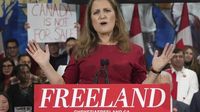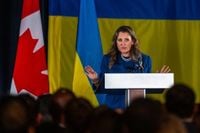Chrystia Freeland, a fixture in Canadian politics for more than a decade, announced on September 16, 2025, that she is stepping down from Prime Minister Mark Carney’s Cabinet and will not seek re-election in the next federal contest. Instead, Freeland will take on a new role as Canada’s special representative for the reconstruction of Ukraine, a move that both closes a significant chapter in her political career and opens a new one focused on international diplomacy and postwar recovery.
Freeland’s decision, delivered in a letter posted to social media and echoed in statements from Carney’s office, marks the end of a remarkable 12-year journey through the upper echelons of Canadian government. In her own words, she made the decision “with tremendous gratitude and a little sadness,” adding, “I do not intend to run in the next federal election. A great strength of democracy is that no one holds political office in perpetuity. After 12 fulfilling years in public life, I know that now is the right time for me to make way for others and to seek fresh challenges for myself.”
Freeland’s exit from Cabinet comes after a turbulent period in Canadian politics. Her abrupt resignation as finance minister and deputy prime minister in December 2024 was a political earthquake, triggering a cascade of events that led to Justin Trudeau’s resignation as prime minister in January 2025. According to BBC, Freeland’s departure from Trudeau’s front bench sent shock waves through Ottawa, especially as she leveled criticism at the government’s “costly political gimmicks” and economic stewardship. Her exit intensified caucus pressure on Trudeau, eventually prompting the leadership race that saw Mark Carney emerge as the new party leader and, later, prime minister.
Freeland did not go quietly into the political night. After her resignation, she ran for the Liberal Party leadership, but her bid was unsuccessful—she received just 8% of the vote in the March 2025 contest, as confirmed by The Canadian Press. Despite the loss, Carney brought her back into Cabinet as Transport and Internal Trade Minister, a testament to her experience and the respect she still commanded within the party’s upper ranks.
Prime Minister Carney, in a statement reported by CBC News, thanked Freeland for her “extraordinary service in the Cabinet of Canada’s federal government over the last decade.” He highlighted her “versatility, raw intelligence and principled leadership,” noting that she had served Canadians with distinction through “extraordinary challenges and changes.” Carney’s praise was not merely perfunctory; he specifically cited Freeland’s leadership during historic trade negotiations, her role in guiding Canada’s response to the COVID-19 pandemic, and her efforts to dismantle internal trade barriers between provinces. “Her leadership has helped to secure historic trade negotiations, to guide the response to a global pandemic, to complete early learning and child-care agreements across Canada and most recently, to remove all federal barriers to internal trade all while strongly representing her constituents,” Carney said.
Freeland’s political career has been marked by a number of firsts and high-profile roles. She became the first woman to be appointed as Canada’s finance minister in 2020, overseeing the country’s financial response to the pandemic. She also served as foreign affairs minister and, notably, as the point person during the renegotiation of the USMCA (known as CUSMA in Canada) free trade deal with the United States and Mexico during President Donald Trump’s first term. That negotiation was a fraught affair, but Freeland’s efforts were credited with helping Canada avoid steep tariffs and secure favorable terms. Trump, however, was less than complimentary, at one point calling her “totally toxic” and “not at all conducive to making deals,” as reported by AP News.
Freeland’s departure from Cabinet was not without its critics. Conservative Leader Pierre Poilievre, speaking to reporters, remarked that her move “mirrored her resignation from Trudeau’s front bench” and speculated that she was “probably trying to get out of town and as far away as possible before this disastrous November budget comes.” The timing was certainly notable—her resignation came just hours before the Liberals announced November 4 as the date for the next federal budget, which is expected to feature a higher deficit.
Beyond the political drama, Freeland’s personal background and international experience make her uniquely suited for her new assignment. She is of Ukrainian heritage, a fluent speaker of five languages, a Harvard graduate, and a Rhodes scholar. Her advocacy for Ukraine has been unwavering, especially since Russia’s 2014 annexation of Crimea, after which she was banned from entering Russia by President Vladimir Putin in retaliation for Western sanctions. Freeland has been a vocal supporter of Ukraine in its ongoing war against Russia, and her appointment as Canada’s special envoy comes at a time when Ottawa is ramping up its aid to Kyiv—Canada committed an additional C$2 billion in military assistance to Ukraine earlier this year, and Carney made a surprise visit to Kyiv in August 2025, according to BBC.
Freeland’s new role as special representative for the reconstruction of Ukraine is a newly created position, one that sits outside Cabinet but carries significant diplomatic weight. Carney explained his reasoning for the appointment, stating that Freeland is “uniquely positioned” for the task given her experience as finance, foreign affairs, and international trade minister. Her mandate will likely focus on coordinating Canada’s contributions to Ukraine’s postwar rebuilding efforts, advocating for multilateral support, and leveraging her international network to rally further assistance for the embattled nation.
In her resignation letter, Freeland was clear about her motivations: “The decision was made not to spend more time with my family or because the burden of elected office is too heavy to bear. For me and for my wonderful husband and children, public service has been a privilege and not a sacrifice. I am grateful for every minute, and I hope more Canadian girls and women will step up and seek the joys and rewards of elected politics for themselves and for their families.”
Freeland’s departure signals not only a personal transition but also a generational shift within the Liberal Party. After 12 years, her exit makes way for a new crop of leaders—Dominic LeBlanc will take on her internal trade duties, and Steven MacKinnon will assume the transport portfolio, with both ministers sworn into their new roles at Rideau Hall.
As she steps into her new role, Freeland leaves behind a legacy of principled leadership, diplomatic acumen, and a willingness to challenge the status quo—even at the expense of her own political fortunes. Her next chapter, focused on Ukraine’s reconstruction, promises to be no less consequential than the one she leaves behind in Ottawa.


